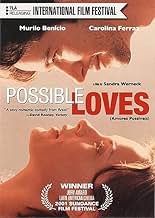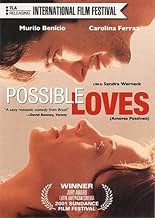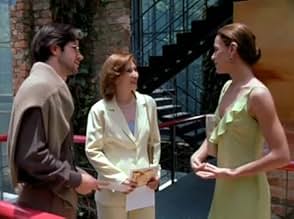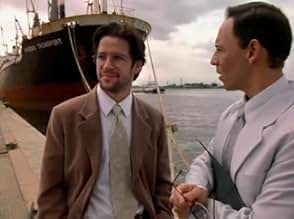Ajouter une intrigue dans votre langueFifteen year ago, Carlos went to the cinema to meet Júlia, his university colleague with whom he was in love. She never showed up. Carlos was left waiting in the lobby alone. While he waits,... Tout lireFifteen year ago, Carlos went to the cinema to meet Júlia, his university colleague with whom he was in love. She never showed up. Carlos was left waiting in the lobby alone. While he waits, something happens which will change his life. A scene, an encounter, an unfinished senten... Tout lireFifteen year ago, Carlos went to the cinema to meet Júlia, his university colleague with whom he was in love. She never showed up. Carlos was left waiting in the lobby alone. While he waits, something happens which will change his life. A scene, an encounter, an unfinished sentence... Something insignificant, but which will determine the character's life. Fifteen year... Tout lire
- Réalisation
- Scénario
- Casting principal
- Récompenses
- 5 victoires et 12 nominations au total
- Dandara
- (as Luíza Mariani)
- Garçom
- (as Silvio Posato)
Avis à la une
The 'story' is three stories in one: fifteen years ago Carlos (the inordinately handsome and talented Murilo Benício) was to meet a fellow college student Júlia (beautiful and elegant Carolina Ferraz) and the film takes that moment and creates three possibilities: 1) Carlos married Júlia and had a son with her and in the present has left her for a male lover Pedro (Emílio de Melo), 2) Carlos longed for her while being married to a comfortable but not exciting Maria (Beth Goulart) and meets Júlia as the film opens, leaving his Maria for his long desired romance with her, and 3) Carlos has never married, is a lothario living with his possessive widowed mother (Irene Ravache) and encounters the artsy looney Júlia as yet another conquest. How these three possibilities for the true ending of a fifteen year missed cinema appointment reveal the true version is the story of the film. Using the same actors for the various roles and mixing the progress of each story variation can confuse the audience at times, but the actors are so fine in demonstrating the varied aspects of each character transformation that the film becomes a suspenseful puzzle. The endings of each version contain important lessons about love and, well, you just have to watch it to enjoy the details.
The film fizzes with sexual excitement on many levels and is completely unafraid to take a realistic look at both straight and gay relationships, showing how similar they actually are. It is not a 'great film' nor does it purport to be, but is certainly entertains and showcases some superbly talented and beautiful actors from Brazil! In Portuguese with English subtitles. Recommended for all audiences. Grady Harp
The actors are handsome/beautiful, and the love scenes are artful. However, don't expect gritty Latin American realism. We are shown a Brazil where everyone is attractive, everyone lives in elegant apartments, and there is beauty everywhere. (No slums, no crime, no blemishes.)
Basically, this film is pared down to three love stories--no one worries about work, or social issues, or whether Lula will become President of Brazil. No one talks about anything besides love, or maybe really sexual passion.
Still, this movie is not boring, it is great to look at, and it is honest in it's own limited way. Not worth a special trip, but worth seeing if the opportunity presents itself.
The first Carlos is married to his wife, Maria, but is not very happy with his life. The second Carlos is divorced with a son and lives with his male lover. The third Carlos is single with a string of different girlfriends and lives at home with his mother.
Each man is reunited with his love, Julia, but the ending for each man is not what you'd expect.
Amores Possíveis (Possible Loves) is an interesting story of three different possible loves. It is acted out well by the main characters Murilo Benico and Carolina Ferraz who play multiple parts.
I also liked the music soundtrack, which featured songs by musicians like Chico Buarque, Zizi Possi, Ana Carolina, João Gilberto, Paulinho Moska, Bonga, Afro Cuban All Stars and much more.
I think Pedro (Emilo de Melo) does a fantastic job at being the voice of reason to Carlos in his various incarnations. Murilo Benicio (Carlos) seems to be at his best acting, portraying the divorced Carlos, who is not sure if he wants Julia or Pedro. Because Benico pulls so much sympathy for Carlos from the audience, you become blind to his selfishness and in a way his manipulation of Julia and Pedro. He knows Julia still wants him and realizes (as Pedro gently reminds him or calls him out, however you want to see it) how easy it is to restore her passion for him. Yet, Carlos portrays himself as a victim of her anger and claims not to understand her viciousness toward him, despite the fact Julia has told him she wishes he were dead. Pedro reminds Carlos he left her for a gay man and thus, destroyed their relationship and her self esteem. The most tender scene between Pedro and Carlos is when Pedro asks Carlos if there is something going on between him and Julia and Carlos says, "I don't know how to lie to you."
Carolina Ferraz does a great job as Julia in all of her incarnations and with each version of Carlos, she realizes his short comings and decides to love him anyway. The way she dresses as ex-wife Julia, is almost symbolic of Julia's feeling her femininity has been cut out or destroyed by Carlos. She reverts back to a soft (she puts on a dress, is less tense), almost casual Julia, when it seems as if Carlos is headed back to her. Ferraz's strongest acting skills come to light as ex-wife Julia. You feel the passion, the pain of betrayal, and the tragedy of loving someone too much and having that person destroy you.
The extended adolescence of Carlos is great and does a good job of capturing the relationship between a mother and son, with a touch of Oedipus complex for good measure. The long shaggy hair, his lack of transportation, and Carlos living at home are all excellent backdrops to a man who fears commitment and is looking for someone just like mom. His arrogance and stupidity are on full display when signing up for computer love.
The tepid relationship Carlos and Maria endure, does a good job of making the audience wanting Carlos to leave Maria for the passion he could share with Julia, but also does a good job of showing what happens when a dream is realized and the reality of that dream, or in this case Julia, comes crashing in. Carlos realizes that even with Julia he cannot escape the demands of a relationship and honesty. His reluctance to leave Maria or hurt her, and his need to be with Julia on a "trial basis" shows the lack of clarity he has. Of course Maria knows Carlos isn't on a business trip, which is why she seems almost smug in her attitude towards Julia in the store, who gets a shock of her own. You see the maturation of Carlos when he ends his relationship with Julia and realizes you can't build a relationship on dreams and lies. He and Maria don't have passion, but they have an investment in each other and clearly he has a profound respect for Maria.
Eventually all versions of Carlos arrive at a point of clarity when he stops deceiving himself and come to grip with the realities of his love for the Julias. The rose colored glasses come off and he finds that there is no form of love that doesn't have thorns. All in all a movie that keeps you interested, with and ode to forties films at the end.
Le saviez-vous
- ConnexionsReferences Le Dernier Métro (1980)
- Bandes originalesDueto
Written by Chico Buarque (as Chico Buarque)
Performed by Chico Buarque (as Chico Buarque) e Zizi Possi
Meilleurs choix
Détails
- Date de sortie
- Pays d’origine
- Langue
- Aussi connu sous le nom de
- Possible Loves
- Lieux de tournage
- Sociétés de production
- Voir plus de crédits d'entreprise sur IMDbPro
Contribuer à cette page



























